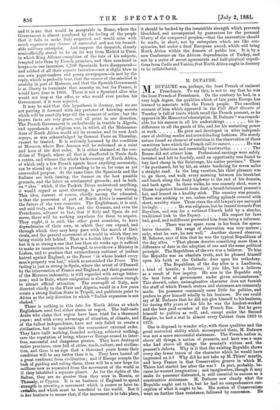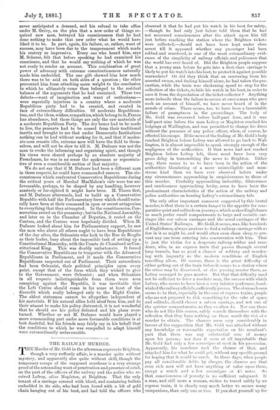M. DUFAURE.
MDUFAURE was, perhaps, the least French of eminent • Frenchmen. To say this, is not to say that he was the least French of Frenchmen. On the contrary he had, in a very high degree, the qualities which of late years Europe has learned to associate with the French people. The excellent account of him which appeared in the Pall Mall Gazette of Tuesday is full of traits which recall the French peasant, as he appears in Mr. Hamerton's description. M. Dufaure " was remark- able for his success in all his undertakings his in- difference to all the gauds of life, and for his sustaining power at work He grew and developed in utter independ- ence of shifting modes and crowd-leading fashions. His sturdy nature found an element of nutrition in the observation of those unwritten laws which the French call les mceurs He was
naturally laborious and essentially trustworthy The Bourse did not attract him. Professional earnings were safely invested and left to fructify, until an opportunity was found to buy land cheap in the Saintonge, his native province." There " he purchased, bit by bit, an estate bordering for seven miles a straight road. In the long vacation, his chief pleasure was to go there, and walk every morning between his breakfast and lunch along the dusty highway to the end of his domain, and back again. In these walks, he was coarsely shod, wore a blouse to protect himself from dust, a broad-brimmed peasant's hat, and leaned on a knobby stick. The country was prosaic. There was nothing to see, unless rolling uplands covered with short, scrubby vines. These vines the old lawyer's eye surveyed lovingly He was religious, but he leaned towards Port Royalism, and was for a national Church held by a slender, traditional link to the Papacy His respect for laws bad, good, and indifferent prevented him from being a reformer.
There was no spare room in his brain for specu- lative theories. His range of observation was very narrow ; only, what he saw, he saw well." Another shrewd observer, M. Scherer, says of him that he was the typical Republican of the day after. " That phrase denotes something more than a difference of date in the adoption of one and the same political principle. The Republican of the eve was a believer. To him the Republic was an absolute truth, and he plumed himself upon his faith as the Catholic does upon his orthodoxy.
The Republican of the day after is a Laodicean, a kind of heretic, a believer, if you like, but a believer as a result of free inquiry. He sees in the Republic only the best form of government under given circumstances." This shrewd, sober, unimaginative character does not furnish the stuff of which French orators and statesmen are commonly made. Its possessor commonly cares little for politics, and prefers to give himself wholly to his business. No one could say of M. Dufaure that he did not give himself to his business, for during fifty years of his life he was the hardest-worked and the best paid member of the French Bar. But he gave himself to politics as well, and, except under the Second Empire, he had a seat in almost every Cabinet from 1839 to 18 One is disposed to wonder why, with these qualities and the great oratorical ability which accompanied them, M. Dufaure was not a more succcessful statesman. The French nation is, above all things, a nation of peasants, and here was a man who had above all things the peasant's virtues and the
peasant's defects. Why is it that the existing Republic shows every day fewer traces of the character which he would have impressed on it ? Why did he not take up M. Thiers' mantle, and keep France in that Conservative groove in which M. Thiers had started her after the war I In part, probably, be- cause he wanted imagination ; and imagination, though it may make its possessor distrusted, is still essential to success as a constructive statesman. M. Dufaure saw clearly what the Republic ought not to be, but he had no comprehensive con- ception of what it ought to be. His notion of Conservatism went no farther than resistance, followed by concession. He never anticipated a demand, and his refusal to take office under M. Grevy, on the plea that a new order of things re- quired new men, betrayed his consciousness that he had done nothing to make that new order what he would have liked it to be. In part, again, his failure, or, rather, want of success, may have been due to the temperament which made his oratory so impressive. Every one who heard him, says M. Scherer, felt that before speaking he had examined his conscience, and that he would say nothing of which he was not ready to render an account. This combination of great power of advocacy with extreme conscientiousness naturally made him undecided. The one gift showed him how much there was to be said on both sides of a question ; the other prevented him from attaching more weight to the conclusion to which he ultimately came than belonged to the residual balance of the arguments that he had examined. These two defects—want of imagination and want of enthusiasm— were especially injurious in a country where a moderate Republican party had to be created, and created in face of extraordinary difficulties. Of moderate Republican- ism, and the ideas, wishes, sympathies, which belong to it, France has abundance, but these things are only the raw materials of a moderate Republican Party. The dry bones had to be made to live, the peasants had to be roused from their traditional inertia and brought to see that under Democratic Institutions nothing can be had without working for it, and that if moder- ate men remain idle, extreme men will have the field to them- selves, and will not be slow to till it. M. Dufaure was not the man to evoke the informing and organising spirit, and though his views were shared perhaps by an absolute majority of Frenchmen, he was in no sense the spokesman or representa- tive of even a considerable section of that majority.
We do not say that if M. Dufaure had been a different man in these respects, he could have commanded success. The cir- cumstances which confronted Conservative Republicans during the critical years of Marshal MacMahon's rule were too un- favourable, perhaps, to be shaped by any handling, however masterly or far-sighted it might have been. M. Thiers first, and M. Dufaure afterwards, had to build up a Conservative Republic with half the Parliamentary force which should natu- rally have been at their command in open or secret antagonism to everything that they attempted. In the constituencies, Con- servatism rested on the peasantry; but in the National Assembly, and later on in the Chamber of Deputies, it rested on the Centres, and the Centres were hopelessly divided. When M. Dufaure looked about him for Parliamentary support, he saw the men who above all others ought to have been Republicans of the day after, the Orleanists who look to the Duo de Broglie as their leader, busy about the impossible task of setting up a Constitutional Monarchy, with the Comte de Chambord as Con- stitutional King. This was doubly unfortunate. It forced the Conservative Republicans to temporise with the Advanced Republicans in Parliament, and it made the Conservative Republicans suspected out of Parliament. Their antecedents had been Orleanist, their political principles upon every point, except that of the form which they wished to give to the Government, were Orleanist ; and when Orleanists in all respects indistinguishable from them were seen conspiring against the Republic, it was inevitable that the Left Centre should come in for some at least of the discredit which really belonged only to the Right Centre. The ablest statesman cannot be altogether independent of his materials. If his natural allies hold aloof from him, and do their utmost to make his policy distrusted, it is not wonderful that he should see his policy defeated and his plans over- turned. Whether or not M. Dufaure would have played a more commanding part under more favourable conditions is at best doubtful, but his friends may fairly say in his behalf that the conditions to which he was compelled to adapt himself were extraordinarily unfavourable.



































 Previous page
Previous page